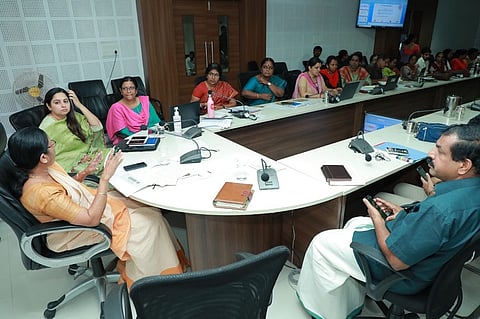

KK Shailaja, Kerala’s Health Minister, would leave her official residence at 8 am for work. In an interview to a Malayalam Channel recently, she said that she wouldn’t sleep before midnight. In another interview, she remarked, “now we don’t sleep properly, we shouldn’t either”.
Many people call the Minister directly on her personal mobile. It is not humanly possible to attend all the phone calls, she had said.
At the Minister’s office, the Directorate of Health Services which administers the whole system, the Medical College Hospitals, General and district hospitals, Community and Public Health Centres, the work is uninterrupted. It is the same unbroken chain from the Minister to the last staff member since January.
It was on January 30 that the first COVID-19 positive case was reported from the state— the first in the country. Kerala, however, had begun preparing the protocol back when China had the novel coronavirus outbreak.
Shortly after this, two more cases were reported in the state. Within two weeks, the second patient had been discharged from hospital; soon, the other two also recovered.
Even when the first three patients- all who had come back from Wuhan- recovered, the Health Department didn’t let up. Rather, they had been gearing in anticipation of a second wave of infection. As of Wednesday, March 25, Kerala has a total of 188 COVID-19 positive cases.
“Yes, we had anticipated this and had been equipping ourselves,” Dr Amar Fettle, nodal officer of the COVID-19 team, tells TNM. Dr Amar works nearly 20 hours a day and hasn't taken a day off in the past two months.
Since January, the team has been working round-the-clock without a break.
“None of us have taken a weekly off since then. We take rest in the hospital only, in the off time, during work. Even when we go home, we have to maintain safe distance from our family members and keep away from public places as far as possible,” Dr Sharmad MS, Superintendent of the Medical College Hospital Thiruvananthapuram, told TNM.
In every district, a minimum of two government hospitals have been designated for COVID-19 treatment.
“The work for the staff has been assigned into three categories— routine work, COVID-19 work and training. We re-worked the manpower we have. We, the doctors, have stopped non-emergency surgeries, reviews and hence, reduced the outpatient workload, phase by phase. But this is not possible in all departments. Those who are administrators as well like superintendents, medical college principals, vice-principals, Regional Medical Officers (RMOs), etc have to coordinate COVID-19 cell works, hold meetings on a daily basis, guide logistic teams, plan, train, etc. The work is the same for all of us across the state,” explains Dr Sharmad.
He further adds, “We get extremely good support from the public and other organisations. Organisations like the Kerala Government Medical Officers’ Association, political outfits like the DYFI, the NGO Manch, various media organisations supply food for staff, including paramedical staff, dresses for those in isolation, masks, gloves, aprons, sanitisers etc. We are happy that we get such huge support.”
A team with Dr Dinesh, a psychiatrist with the Government Mental Health Centre at Oolampara in Thiruvananthapuram, has been busy setting up a COVID-19 care centre at the women’s hostel of a college in the city since Tuesday. The government decided to transform 44,00 single hostel rooms as COVID-19 care centres owing to a jump in the number of people who are in isolation too.
“There are 18 people here now; they are mostly those who returned from coronavirus-affected regions; those who are symptomatic and those who had come into primary contact with the infected people. We have been in the task of transforming a hostel room into a hospital. It would be transformed to house 70 people initially and 500 people later if needed,” Dr Dinesh, who is among the doctors designated by the government for COVID-19 work, tells TNM.
A team of 12, including three doctors and four staff nurses, from the Thiruvananthapuram Corporation and some volunteers, have been on their toes since last night for the task.
A male nurse of a government hospital in Ernakulam told TNM that they don’t think about their effort but are happy when the test results of positive or suspected people show negative in the final examinations.
“And it’s not just the entire team including doctors. More staff members are assigned so that patients get proper care and those who are assigned for that work are protective staff. Even those under the protective category are vulnerable to be infected, which is called protected exposure. But the staff shift will be changed so that not all staff are exposed by working for long hours,” says the nurse.
“It has been the same. We start work by 8.30 in the morning and leave by midnight ever since the LDF government came to power; not just during the Nipah outbreak or COVID-19,” a staff member at the Health Minister’s office tells TNM.